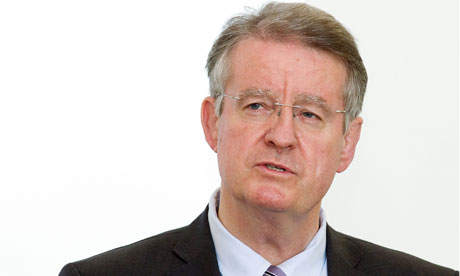
Bill Beaumont, the former England captain, will resume his battle to wrest the chairmanship of the International Rugby Board from Bernard Lapasset in Singapore in December, after the vote was deferred in an acrimonious meeting that may prompt a change to the way the sport is run.
One delegate described Wednesday's meeting as the most depressing he had ever attended and compared delegates' "disgusting" behaviour with their football counterparts – he asked: "Have we learned nothing from Fifa?"
As the respective camps lobbied for votes and made promises and threats, insults were hurled from one side to the other. One of the Welsh Rugby Union's representatives, Gerald Davies, one of the greatest players in the history of the game and someone who is not versed in the dark arts of the committee room, got to his feet and implored: "Gentlemen, take a look at yourselves. This is not the way to behave."
The meeting did not split on the usual north-south hemisphere lines. While the four home unions were lined up behind Beaumont, France and Italy supported Lapasset, who was also backed by South Africa, Australia and Argentina. New Zealand endorsed Beaumont, a member of the Rugby Football Union's board of directors, because he had offered the vice-chairmanship to the former All Blacks captain Graham Mourie.
The meeting turned ugly when it became clear that the associations representing the smaller unions, such as Asia, Africa, North America and Europe, held the balance of power. They were wooed with offers, but some delegates were warned about the consequences of voting for the other side, threatened with the loss of financial support and an end to development tours.
The debate deteriorated to such an extent that Australia called for a vote to defer the election for a couple of months to allow everyone in the room to calm down. That prompted another row, with the four home unions vehemently opposing the move. But when it was eventually put to the meeting in a secret ballot, the result was a 13-13 deadlock.
Lapasset used his casting vote to postpone the meeting until 4 December and it was agreed it would be held on neutral territory, in a country that would be one flight away for the delegates. The vote was interpreted as how a ballot would have reflected support for the chairmanship, but there would have been no casting vote in that instance. Delegates would have kept on voting until one candidate had a majority.
Lapasset's camp was angry that a delegate from one of the associations had defied a mandate and voted for Beaumont. He will be replaced at the next meeting by someone who will vote as ordered, leaving Beaumont, who has offered to fly to the Four Nations countries who do not support him to put his case to their boards, with ground to make up.
Beaumont was asked by one delegate why he was standing and whether his motivation was that it was his turn, having been Lapasset's deputy for four years. Lapasset was criticised for not being firm enough as chairman and not making moves to replace the chief executive, Mike Miller, who has enraged the major southern hemisphere unions at the World Cup. His position now looks untenable whoever becomes chairman.
"I have been to a number of IRB meetings, but I have never left one feeling so depressed and appalled," a delegate said. "It was not just that it was bitter and heated, but you just sat back and asked yourself if this is how the game is being run at such a financially challenging time, what hope do we have? What are we all in it for? It should have proved to everyone once and for all that we need to fundamentally change the way the board is run.
"The voting system needs to be altered. It is ridiculous that the eight foundation unions get two votes each and associations that represent 40 or 50 countries get only one. The game has to be run on a global basis and on robust, commercial lines, and not continue to be organised as it was in the amateur era. If we carry on as we are, I fear the consequences. The horse trading and threats on Wednesday were disgusting."
An upshot of the deferred vote was that the IRB executive meeting to discuss the 2015 World Cup, including the timing of the event, how tournament will be divided up and how commercial restrictions on the sponsors could be relaxed, has been put back until February, when Dublin will be the venue. That is bad news for the hosts, England, who are anxious to book football stadiums as venues, but cannot do so until they know if the tournament will kick off in September or October.

